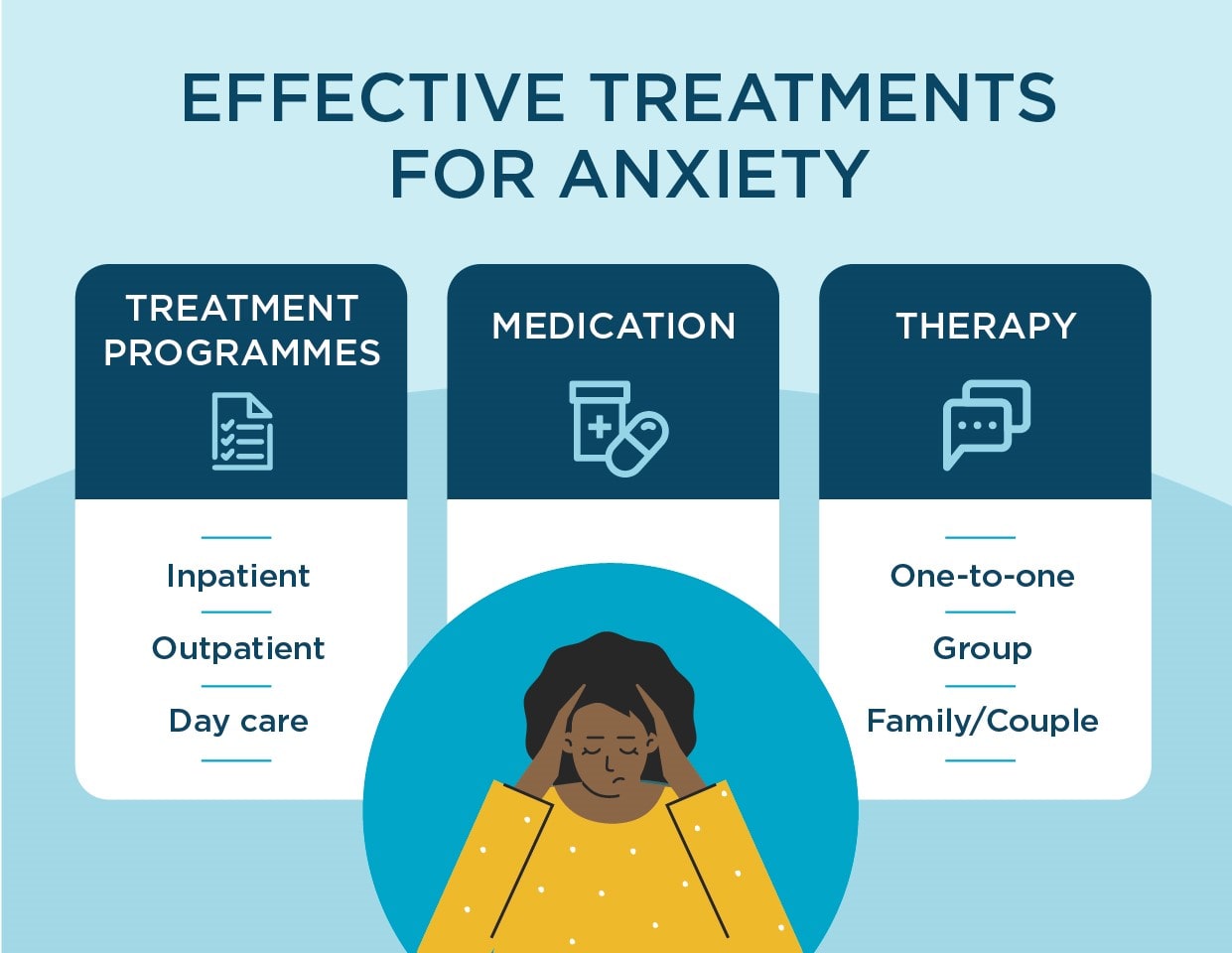Discovering Various Methods in Coaching for Anxiety Condition for Enduring Adjustment
When dealing with anxiety conditions, it's vital to explore a selection of counseling methods. Each approach provides distinct insights and devices to assist you handle your signs properly. You could locate that combining techniques can yield the very best results. Nonetheless, recognizing the subtleties of these methods is crucial to fostering long-term adjustment. What happens if the ideal mix could launch a new level of psychological wellness for you?
Recognizing Anxiety Conditions: A Brief Overview
Anxiousness problems, which impact millions of individuals worldwide, can significantly impact everyday life. You might experience overwhelming sensations of anxiety or stress that seem irrepressible. These feelings can result in physical symptoms like a racing heart, sweating, and even lightheadedness. Common kinds of stress and anxiety conditions consist of generalised stress and anxiety problem, panic attack, and social stress and anxiety condition. Each has special indicators, however they all share a propensity to disrupt your routine and relationships.Understanding the source of your anxiousness is essential. It may come from genetics, brain chemistry, or life experiences. Identifying your triggers can help you handle your actions much better. It's essential to keep in mind that you're not alone in this battle. Numerous individuals encounter comparable difficulties, and seeking aid is a strong action towards sensation better. By discovering anxiety conditions, you're already on the path to understanding and managing your condition a lot more efficiently.
Cognitive-Behavioral Treatment: Challenging Unfavorable Idea Patterns

Determining Unfavorable Thought Triggers
When you come across moments of distress, recognizing the particular triggers behind your unfavorable thoughts can be crucial in taking care of anxiousness. Start by taking note of situations that provoke sensations of worry or concern. Is it a crowded space, a forthcoming deadline, or a conversation with particular people? Write these circumstances in a journal. This will assist you identify patterns in your reasoning. Likewise, notice physical feelings that accompany your unfavorable ideas, like a racing heart or rigidity in your upper body. By pinpointing these triggers, you gain insight right into what's sustaining your anxiousness. Understanding these links is the first step in testing those thoughts and inevitably restoring control over your psychological reactions.

Changing Thoughts With Positives
Testing negative idea patterns is an essential step in transforming your frame of mind and lowering stress and anxiety. You might commonly find yourself entraped in cycles of insecurity or tragic reasoning. Rather of allowing these thoughts dictate your sensations, method replacing them with positive affirmations or practical options. When you assume, "I can't handle this," change it to, "I can manage difficulties one step at a time." This basic adjustment can greatly affect your mood. Consistently identifying and responding to these adverse ideas helps create a healthier interior dialogue. Keep in mind, it takes time and effort, yet constantly exercising this strategy can cause long lasting change, equipping you to face stress and anxiety with restored confidence and durability
Building Coping Methods With Each Other
Changing unfavorable thoughts is only the beginning of managing anxiety successfully. To produce long-term adjustment, you require to construct coping methods that equip you. Cognitive-Behavioral Therapy (CBT) assists you determine and test those unhelpful thought patterns. With each other, you and your therapist can explore how these thoughts influence your sensations and behaviors.Start by creating functional techniques, like journaling or mindfulness workouts, that allow you to face anxiousness head-on. When you face your concerns progressively, you'll find out to react differently.

Mindfulness and Acceptance-Based Approaches: Cultivating Present-Moment Recognition
As you browse the complexities of stress and anxiety, integrating mindfulness and acceptance-based techniques can significantly improve your capability to cultivate present-moment understanding. By focusing on the right here and now, you'll find that you can observe your thoughts and sensations without judgment. This technique assists you acknowledge your stress and anxiety without feeling bewildered by it.Engaging in mindfulness workouts, such as deep breathing, body scans, or assisted meditations, allows you to ground on your own in your existing experience. Acceptance-based methods motivate you to embrace your feelings as opposed to battle against them. When you accept your sensations, they shed their power over you.Incorporating these practices into your day-to-day routine can transform just how you react to stress and anxiety. You'll create durability and learn to navigate demanding circumstances with greater convenience. Eventually, cultivating present-moment recognition lays the foundation for long-term modification, empowering you to lead a much more fulfilling life.
Direct Exposure Therapy: Facing Fears Progressively
Exposure treatment helps you face your fears in a progressive way, making it less frustrating. You'll learn strategies to face anxiety-provoking circumstances step by step, while additionally building coping methods to handle your reactions. This approach empowers you to take control and reduce anxiousness in time.
Steady Direct Exposure Methods
When dealing with anxiousness, gradually facing your anxieties can be a powerful way to restore control. This technique, recognized as progressive direct exposure, entails slowly subjecting on your own to the scenarios or objects that trigger your stress and anxiety. Begin with much less daunting scenarios and gradually work your method as much as even more difficult ones. If you're terrified of public talking, you may begin by speaking in front of a mirror, then progress to sharing thoughts with a pal, and ultimately attend to a little group. Each step helps desensitize you to the worry, developing your confidence in time. Keep in mind, it's important to rate on your visit this web-site own and commemorate tiny triumphes as you relocate with this process, reinforcing your capacity to take care of anxiousness successfully.
Structure Coping Methods
Structure reliable coping methods is necessary for handling anxiety, specifically as you face your concerns gradually. One powerful approach is exposure therapy, where you begin by facing your anxieties in a regulated way. Start with much less daunting situations and gradually function your method up to even more tough circumstances. This steady direct exposure assists desensitize you to stress and anxiety sets off, making them much less overwhelming.Incorporate relaxation strategies, such as deep breathing or mindfulness, to soothe your mind during direct exposure. Track your development, commemorating little triumphes along the road to boost your confidence. Bear in mind, it's alright to take your time; the objective isn't perfection yet steady renovation. By developing these strategies, you'll equip on your own to navigate stress and anxiety and welcome life much more completely.
Psychodynamic Treatment: Uncovering Origin of Anxiety
Psychodynamic therapy checks out the subconscious mind, disclosing the source of your anxiousness - Counseling services for anxiety. By analyzing your thoughts, feelings, and past experiences, this method aids you reveal underlying conflicts and unresolved problems that may add to your present anxiousness. You'll deal with a specialist to investigate youth experiences, connections, and emotional patterns that form your actions today.As you obtain insight into these deeper layers of your psyche, you'll start to acknowledge exactly how previous occasions affect your present behavior. This understanding can cause catharsis, enabling you to process feelings you may have suppressed.Through the healing relationship, you can likewise recognize protection mechanisms that may have developed in time, using a more clear path to alter. Inevitably, psychodynamic therapy equips you with the tools to address your stress and anxiety at its core, advertising long lasting transformation in your emotional wellness
Alternative and integrative Techniques: Combining Methods for Greater Efficiency
Integrating different therapeutic strategies can enhance your trip towards managing stress and anxiety more properly. By combining components from cognitive-behavioral treatment, mindfulness techniques, and all natural techniques, you can produce a tailored strategy that addresses your special demands. As an example, you may use cognitive-behavioral techniques to test negative idea patterns while incorporating mindfulness workouts to ground yourself in the present moment.Additionally, checking out all natural practices such as yoga exercise or reflection can promote relaxation and lower anxiety signs and symptoms. This blend enables you to establish better self-awareness and resilience.Experimenting with these varied techniques can assist you uncover what resonates most with you. Remember, it's about finding a synergy that functions, as opposed to adhering to a single technique. This integrative technique not only provides instant relief yet additionally promotes long-term skills for handling anxiety, equipping you to redeem control over hop over to these guys your life.
The Function of Assistance Systems: Building Resilience Through Connection
While it may seem that handling stress and anxiety is a solitary journey, having a strong support group can play a crucial duty in your strength. Bordering on your own with understanding buddies, family, or support teams develops a secure room where you can honestly share your sensations and experiences. When you link with others, you remind yourself that you're not alone in this struggle.These relationships provide motivation and can offer practical coping strategies that have actually benefited others. It's additionally a possibility to acquire perspective; close friends can assist you straight from the source see circumstances differently, lowering sensations of isolation.Moreover, emotional assistance promotes a sense of belonging, which can greatly relieve stress and anxiety symptoms. By leaning on your support group, you can develop resilience and take on difficulties more properly. Remember, connecting for aid is a sign of stamina, and it can make all the difference in your journey towards taking care of anxiousness.
Regularly Asked Concerns
What Are the Typical Symptoms of Stress And Anxiety Disorders?
You might experience restlessness, exhaustion, difficulty focusing, impatience, muscle stress, and rest disturbances. Physical signs and symptoms can include rapid heartbeat, sweating, and shivering. Identifying these signs early can assist you look for appropriate support and therapy.

Just How Long Does Therapy Commonly Last for Anxiety Disorders?
Therapy for stress and anxiety problems commonly lasts anywhere from a few weeks to several months. It really depends upon your private requirements, progression, and the strategies your specialist uses to help you manage your anxiety effectively.
Can Medication Be Used Together With Therapy for Anxiety?
Yes, medication can absolutely be utilized together with therapy for anxiety. Combining both approaches frequently improves treatment effectiveness, helping you manage symptoms while discovering underlying concerns via counseling. Always consult your healthcare service provider for customized advice.
Exist Self-Help Approaches for Handling Stress And Anxiety?
Yes, there are a number of self-help strategies for taking care of anxiety. You can practice mindfulness, take part in normal workout, maintain a well balanced diet plan, establish a regular, and use deep breathing techniques to help in reducing anxiety signs and symptoms successfully.
How Do I Know if I Required Expert Aid for Stress And Anxiety?
You should take into consideration seeking specialist assistance for anxiousness if it disrupts day-to-day life, triggers substantial distress, or if self-help methods aren't functioning. Count on your reactions; reaching out can bring about much better coping abilities and support. Typical kinds of anxiety problems include generalized anxiousness disorder, panic condition, and social anxiousness disorder. When you run into moments of distress, acknowledging the details triggers behind your negative thoughts can be crucial in managing stress and anxiety. Changing negative thoughts is only the start of taking care of anxiety efficiently. By analyzing your ideas, sensations, and past experiences, this method assists you reveal underlying conflicts and unresolved problems that may add to your existing anxiousness. It's also a chance to acquire viewpoint; friends can assist you see circumstances in different ways, lowering sensations of isolation (Counseling services for anxiety).Moreover, psychological assistance cultivates a feeling of belonging, which can greatly minimize stress and anxiety signs